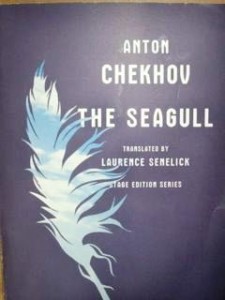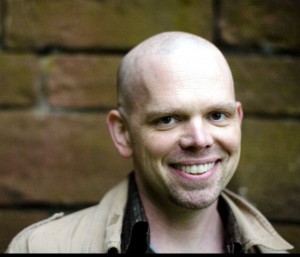 Chekhov’s The Seagull is the inaugural production of World’s End Theater Company
Chekhov’s The Seagull is the inaugural production of World’s End Theater Company
By Alison Rooney
Director and writer John Plummer is concerned that “classics of the theater” have acquired a bad reputation for being turgid and creaky. He’s also concerned that, in trying to right that wrong impression, sometimes contemporary productions accentuate what’s facile: updating the time frame of the work, dressing it up in modern trimmings but missing the emotional core which made it a classic in the first place. “There seems to be a Pavlovian response from anybody, say, under 50, to change the channel when it comes to classics,” says Plummer. And even if a mod coat of paint is applied to a production, it can still be, Plummer notes, “fusty and formulaic.”

Gordon Stewart feels the same way. Stewart, whose many job descriptions include theater director, political speech writer and publisher of Philipstown.info, feels, according to Plummer, that “classics are under-seen, undervalued, have so much to give us, but we have so little access to them.” Plummer adds that “there’s a false idea of classics – that they’re dry.” The two men had a previous theatrical connection. A year or so ago, Plummer was unable to fulfill a commitment to direct a local production of Ariel Dorfman’s political play, Death and the Maiden when he got a writing job. Knowing of Stewart’s background, Plummer suggested that Stewart replace him and “it went very well.” Meeting up by chance on Metro-North later, they got to talking about local theater in Philipstown, and the Depot Theatre in particular.

A community theater in a community full of theater professionals, the Depot has, at times, been caught in a bind where Actors Equity Association (AEA) members seeking to work locally have not been able to, because of union restrictions. However, on occasion, through what is called an Equity Special Agreement Contract, AEA members have been able to perform there. There are a number of stipulations with this contract, including a limited run and a limited number of AEA actors, and there are fewer Equity regulations enforced. A play of Plummer’s, Rendition in Damascus, had been presented at the Depot under such an agreement. “There are so many talented people in who live in this community. Isn’t it better to use the local community and mix Equity and non-union designers, composers, musicians?” asks Plummer. Stewart and Plummer reached out to Philipstown theatre professionals, and during a meeting at Stewart’s house in September an idea was hatched to start a new theater company, focused on the classics, based in Philipstown, but not at any particular venue, though the first production will take place at the Depot. Along with Plummer and Stewart, the other founding members of this company are Amy Dul, Maia Guest, Donald Kimmel, Jenn Lee, and Nancy Swann.
Plummer is quite clear on the intentions of the new company: “this is not about doing old work, but doing work that is great in a fresh way – too often theater is static, controlled – you get exactly what you expected – people have become habituated to seeking a predictable satisfaction, the “McDonaldsization” of life.” The company’s first effort, Chekhov’s The Seagull, will be rehearsing in April and May, and presented for four weekends in late May and June; auditions take place this weekend. The Seagull was chosen as the first production because, as Plummer notes, it is “somewhat about the creation of the theater.”
Feeling that “the job of a theater company is to serve the writer - yes, the play’s the thing - Plummer says that “if we view the play as our mentor and us as disciples, the mentor isn’t above you – you need to fuse and share a mission: unite, respect the play and inspire and entertain.” All of this entails not putting Chekhov or any similar writing luminary “high on the mountain. Tear down the walls between you and the script, the company and the environment, actors and other actors, actors and audience.”
The text of The Seagull offers guidance to the new company. Plummer cites the character Konstantyn, a young playwright, “Yes, I’m more and more convinced that the point isn’t old or new forms, it’s to write and not think about form, because it’s flowing freely out of your soul.” For Plummer, “The point isn’t that it’s old, or new, it’s to create. The play itself is concerned with forms in general, forms of relationships: Are we married? Is she a mother or is she an actress?; and so on. Too much adherence to form without investigating the heart will lead to ruination.”

Nina, another young character, has this to say near the end of the play: “And so, now you’re a writer. You’re a writer, I’m an actress – we’ve both fallen into the maelstrom.” Plummer is looking this kind of “restless, disordered, tumultuous state of affairs” with this production.
The name of the fledgling company, World’s End, has its own connection to maelstroms. In trying to come up with a name that reflected what the company is all about, the use of the word maelstrom set Plummer thinking about them, and their connotations of “taking down many a ship; challenging many a captain,” when he realized that a very famous maelstrom was right nearby, at the bend of the Hudson at a very deep point of the river, near Constitution Island, dubbed “World’s End” and handily giving a very apropos acronym to this non-dry version of classics company: WET.
World’s End intends to use the varied and beautiful landscapes and interiors of the Hudson Highlands as a setting and backdrop to many of their productions. Hopes are, if permission is granted, to set the first two acts of The Seagull outdoors, around the gazebo at Garrison’s Landing, matching almost precisely the setting of the play at dusk at a makeshift outdoor theater by a lake. The fear associated with a maelstrom fuels Plummer’s vision as well. “Not enough money; not enough audience; too much competition: it is great for a theater company to deal with and work through fear. My task is to encourage fusion – even fusion with our fears, and use fears as a motivating force.” In keeping with Plummer’s view that “this play has a mission: to get us to recognize that we are not separate, we are connected, - the audition process will be more free flowing, and hopefully less fear-inducing than the usual spotlighted recitation of text on cue. For more information on the auditions, click here.

I read about you in The New Yorker. Bravo – keep going.